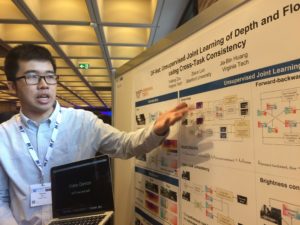Ph.D. student Yuliang Zou presents DAC research at ECCV 2018

DAC Ph.D. student Yuliang Zou shares research on unsupervised learning of depth prediction and optical flow estimation at ECCV.
Yuliang Zou, a Ph.D. student at the Discovery Analytics Center, was in Munich, Germany, earlier this week to participate in the 2018 European Conference on Computer Vision ECCV. The conference, held every other year, is one of the most influential academic conferences for this area of research.
At the main conference, Zou presented a poster on “DF-Net: Unsupervised Joint Learning of Depth and Flow using Cross-Task Consistency.”
This research, conducted with his DAC faculty advisor Jia-Bin Huang and Zelun Luo, a Stanford University student, focuses on unsupervised learning of depth prediction and optical flow estimation — two fundamental problems in computer vision with many applications.
‘It is difficult to collect high-quality dense annotated data to train the models for such dense prediction tasks, so we propose an unsupervised method to train these models,” said Zou. “Our core idea is that motions for the static and non-occluded pixels can be fully determined by the depth values and the camera pose transformations. On the other hand, we have another network to estimate the motions simultaneously. As a result, we have two different ways to describe these motions. We can thus leverage the inconsistency between the two predictions as a supervisory signal to help train the model.”
Zou also presented “iCAN: Instance-Centric Attention Network for Human-Object Interaction Detection,” at the 1st Person in Context (PIC) Workshop. The submission secured a third place on the person in context challenge and received a prize with two NVIDIA GPUs.
Four other papers co-authored by Huang were presented at the ECCV conference: